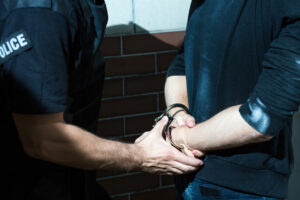
Is your child facing criminal charges in McKinney, TX? A juvenile arrest can lead to serious consequences that follow your family for years. Call Texas Defense Firm at (972) 369-0577 today to learn how a criminal defense lawyer can help.
When your child’s rights and future are on the line, you deserve guidance from attorneys who know Texas juvenile law inside and out. Contact our team today to schedule a initial consultation with a McKinney juvenile crimes lawyer.
Why Hire Texas Defense Firm if You’re Arrested for Juvenile Crimes

Parents and families across McKinney, TX, often turn to Texas Defense Firm, when their child faces criminal charges. When the stakes are high, experience and commitment matter. We’re known for standing up for juveniles in some of their most difficult moments.
With our team, you never have to face the juvenile justice system alone or wonder if your case is being handled with the attention it deserves. When you choose us, you benefit from:
- Our legal team has more than 200 years of combined experience protecting young clients in the juvenile justice system.
- Our law firm has been recognized as the best criminal defense firm in McKinney.
- 24/7 access to our criminal defense team. Someone is always available to answer your call, give you legal guidance, or update you on your child’s case.
- Legal leadership backed by recognition from Texas Super Lawyers, an honor given to only 5% of attorneys in the state.
- A proven commitment to all clients we represent, as well as their families.
Choosing the right lawyer can mean the difference between a second chance and a lasting criminal record. If your family is dealing with juvenile charges, let us protect your child’s future and give your family the peace of mind you deserve.
Contact us today to schedule a consultation with a McKinney criminal defense attorney.
Juvenile Crimes in Texas
The juvenile justice system in Texas is built on the belief that young people can change. When a minor is accused of breaking the law, the process is different from that for adults and focuses more on rehabilitation than punishment. The goal is to hold youth accountable, help them avoid a criminal future, and give them a chance to move forward.
How Juvenile Charges Work
Instead of criminal charges, juveniles face allegations of “delinquent acts.” Some youth may also be accused of Conduct in Need of Supervision (CINS), which covers certain behaviors that might not be considered crimes for adults.
Some common juvenile offenses include:
- Status offenses: Behaviors only considered against the law because of the child’s age, like truancy, curfew violations, underage drinking, and running away.
- Juvenile delinquency: Minor criminal acts, including traffic violations, disorderly conduct, minor vandalism, or school-related incidents such as cheating or disruptive behavior.
- Property crimes: Acts like shoplifting, trespassing, unauthorized vehicle use, vandalism, or stealing from others.
- Violent crimes: Includes harassment, simple assault, weapons possession, and reckless actions that endanger others. More serious violent offenses (like aggravated assault, sex crimes, or murder) can lead to a juvenile facing charges in adult court.
The goal is ultimately to help young people find a better path before a single mistake becomes a lifelong issue, but the impact of these charges can still be serious.
When Can a Juvenile Be Taken Into Custody?
When a young person is suspected of breaking the law, law enforcement can take them into custody in ways that are similar, but not identical, to adult arrests.
Police can detain a juvenile without a warrant if there’s a reasonable belief that the youth committed a delinquent act or a crime. Detention is also allowed if the child has violated probation or is considered in need of supervision.
In some situations, authorities use a “directive to apprehend,” which is a court order much like a warrant for adults.
What Happens After the Arrest?
Once in custody, a young person must be brought directly to a juvenile processing office, not kept in a regular jail or police holding cell with adults. The law requires officers to contact the child’s parents or guardians right away and explain both the custody and the reason for it.
Soon after the youth is taken in, the court must schedule a detention hearing to decide if continued detention is necessary. The judge will review factors like risk of flight or danger to the public before making a decision about release or further detention.
These steps are meant to balance public safety with the rights of young people, ensuring parents are involved and that juvenile cases move quickly through the system.
What Are the Penalties for Juvenile Crimes in McKinney, Texas?
The penalties for juvenile crimes in McKinney depend on the details of the case, the youth’s history, and how the court decides to handle the matter. While young people aren’t “convicted” like adults, being adjudicated delinquent can still have lasting effects.
Here are some of the possible penalties a juvenile may face in Texas:
- Juvenile record: Having an official record can make it harder to get into certain colleges, secure scholarships, or qualify for jobs later on.
- Juvenile detention: The court may order time in a juvenile detention facility, which can disrupt school and family relationships.
- Suspended or revoked driver’s license: A teen may lose their driving privileges for a period of time, making it difficult to get to school or work.
- Restitution to victims: The court may require the juvenile (and their family) to pay for damages or losses suffered by victims of the offense.
- Fines: In some cases, the court imposes financial penalties that must be paid as part of the punishment.
- Court-ordered counseling: The youth may be required to attend counseling sessions to address behavioral or emotional issues related to the offense.
- Substance abuse treatment: If drugs or alcohol were involved, the court may order mandatory treatment or education programs. Community Service: The court often mandates a set number of hours volunteering or working in the community as a way to repay society.
- Home confinement: Some juveniles may be required to stay at home during certain hours, rather than being sent to a facility.
- Probation: The court may place the juvenile under supervision, with strict rules and regular check-ins for a certain period of time.
Not every child will face all of these penalties, and many cases focus on second chances. The best way to mitigate the consequences your child is facing is to speak with an experienced lawyer right away.
What Defenses Can Be Raised if I’m Arrested for Juvenile Crimes?
Facing juvenile charges in Texas can be overwhelming, but there are several legal defenses that may protect your child’s rights and future. The exact defense depends on the facts of the case, but here are some common options.
The following are examples of possible defenses to juvenile crimes:
- Lack of evidence: The prosecutor must prove beyond a reasonable doubt that the juvenile committed the alleged act. If there are gaps in the evidence or conflicting accounts from witnesses, your attorney can challenge the charges and possibly have the case dismissed or the charges reduced.
- Self-defense or defense of others: Juveniles sometimes act to protect themselves or someone else from harm. If the response was reasonable given the circumstances, self-defense or defense of others can be a strong argument against charges involving physical contact.
- Mistaken identity: Juveniles are sometimes accused simply because they were in the wrong place at the wrong time, look like another suspect, or were identified in the confusion of an incident. Demonstrating that someone else was responsible or that your child was misidentified can be a powerful way to fight the accusations.
- No intent or accident: Many juvenile offenses require the State to prove that the juvenile meant to break the law. If your child’s actions were accidental or misunderstood, the defense can show that there was no criminal intent, which can lead to a reduction or dismissal of charges.
- Alibi: If your child was somewhere else when the incident occurred, witness accounts, video footage, or receipts can be used to support an alibi. This kind of evidence can show there is reasonable doubt and that your child couldn’t have committed the alleged act.
An attorney will explore all possible defenses to give your child the strongest possible chance of a fair outcome and the opportunity to move forward with their life.
Schedule a Initial Case Evaluation With Our McKinney Juvenile Crimes Lawyer
Don’t let your child’s future depend on chance or inexperience. At Texas Defense Firm, we are committed to fighting for your family and securing the best possible result for your child’s situation in McKinney, TX.
With two centuries of combined legal experience on your side, you can feel confident knowing your child’s rights are protected from the very first call. Contact our firm today to schedule a consultation with a McKinney juvenile crimes lawyer.
